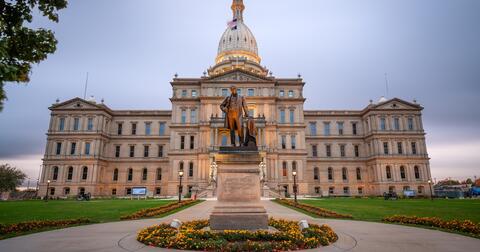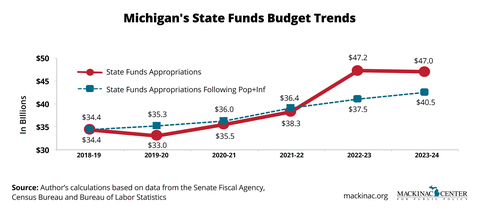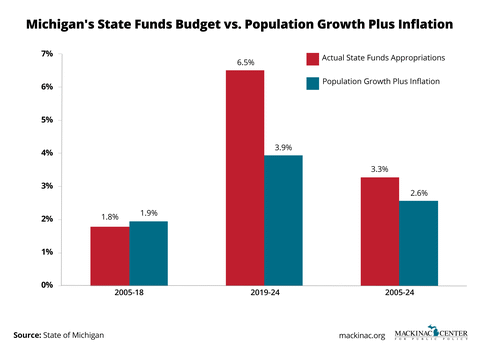Commentary
Michigan’s budget isn’t sustainable…Yet
Lawmakers should practice more restraint

Shutterstock
Michigan’s budget since the COVID-19 pandemic has ramped up beyond what taxpayers can afford. Gov. Gretchen Whitmer’s latest budget keeps Michigan at those elevated, unsustainable levels. Legislators should correct this.
Lawmakers shouldn’t have a state budget that increases the state budget faster than the average taxpayer’s ability to pay for it. The question is: What is a good measure of how much taxpayers can afford? Spending an amount people can easily manage would keep the state government affordable, but spending more could be catastrophic, as it crowds out people’s opportunities to thrive.
Elected officials should be cautious when spending scarce taxpayer money. A good measure to use as a maximum growth rate of the budget is the rate of population growth plus inflation. Restraining the budget to less than this measure helps ensure people can afford state government without exacerbating the costly effects of higher taxes.
There are already some limits on what the state government can spend. Unlike the federal government, the state has a balanced budget requirement. This means lawmakers may not authorize spending more than the state taxes in through taxes, plus savings from previous years.
Lawmakers should practice more restraint because they have spent much more than the combined rate of population growth and inflation.
The money the state collects in taxes and fees has risen dramatically since the COVID-19 pandemic, and so has its budget. The state- funds part of the budget, which excludes federal funds, is up from $34.4 billion in 2018-19 to $47.0 billion in 2023-24, a 37% increase. Population growth plus inflation increased by 22% over this period.

Had lawmakers kept the budget at sustainable levels, taxpayers would save $6.5 billion this year. That’s enough to cut the state’s personal income tax rate in half. The increase in spending, by contrast, costs a typical household $1,600 per year.

The state funds budget is up nearly 11% when adjusted for population growth plus inflation but little else in the economy has gone up. The inflation-adjusted median household income remains well below its recent peak of 2019. The number of jobs in Michigan is up just 0.3% since the pandemic lockdowns, the 11th worst performance among the states. And the state’s labor force participation rate of 62.2% ranks 30th in the country. Labor force participation would be even lower had people not left the state for more opportunities to work and raise a family.
What have residents received in return for the state’s unsustainable budget increases? Record amounts of pork. Lawmakers approved $4.4 billion in unfair, ineffective, and expensive corporate welfare spending last year. Surely, more restraint on the part of policymakers would have resulted in better spending habits.
Gov. Whitmer’s executive budget at least recognizes that state budget trends have been unsustainable. Revenue isn’t expected to increase, and she recommends appropriating 1.5% less in the upcoming fiscal year.
The lack of budget growth comes from stagnant tax revenue, not spending restraint. The budget even calls for continued spending based on Whitmer’s interpretation of a tax cut statute, which caused a tax hike. The Michigan Supreme Court will soon decide whether the tax increase will remain in place. Her proposed budget includes spending $700 million more based on it.
The governor’s recommended decrease in spending demonstrates that the growth in state spending could not be sustained. Lawmakers would be in a much better position now had they been much more careful with previous budget increases. Now they will have to revisit their priorities because spending increased faster than the average taxpayer’s ability to pay for it.
Budgeting at sustainable levels would help residents and lawmakers alike. It’s better than appropriating every available dollar and sets up the state for regular growth. It also ensures that more money is in the productive private sector.
Lawmakers ought to practice restraint and pass a budget without assuming that income taxes will increase. This requires setting aside at least $700 million so they don’t spend money that ought to remain with residents.
Doing so would help correct past budget excesses and help provide a sustainable budget that Americans for Tax Reform and others across the country advocate — and ensure that more money can stay in the pockets of hard-working Michiganders.
|

Michigan’s budget isn’t sustainable…Yet
Lawmakers should practice more restraint
Michigan’s budget since the COVID-19 pandemic has ramped up beyond what taxpayers can afford. Gov. Gretchen Whitmer’s latest budget keeps Michigan at those elevated, unsustainable levels. Legislators should correct this.
Lawmakers shouldn’t have a state budget that increases the state budget faster than the average taxpayer’s ability to pay for it. The question is: What is a good measure of how much taxpayers can afford? Spending an amount people can easily manage would keep the state government affordable, but spending more could be catastrophic, as it crowds out people’s opportunities to thrive.
Elected officials should be cautious when spending scarce taxpayer money. A good measure to use as a maximum growth rate of the budget is the rate of population growth plus inflation. Restraining the budget to less than this measure helps ensure people can afford state government without exacerbating the costly effects of higher taxes.
There are already some limits on what the state government can spend. Unlike the federal government, the state has a balanced budget requirement. This means lawmakers may not authorize spending more than the state taxes in through taxes, plus savings from previous years.
Lawmakers should practice more restraint because they have spent much more than the combined rate of population growth and inflation.
The money the state collects in taxes and fees has risen dramatically since the COVID-19 pandemic, and so has its budget. The state- funds part of the budget, which excludes federal funds, is up from $34.4 billion in 2018-19 to $47.0 billion in 2023-24, a 37% increase. Population growth plus inflation increased by 22% over this period.
Had lawmakers kept the budget at sustainable levels, taxpayers would save $6.5 billion this year. That’s enough to cut the state’s personal income tax rate in half. The increase in spending, by contrast, costs a typical household $1,600 per year.
The state funds budget is up nearly 11% when adjusted for population growth plus inflation but little else in the economy has gone up. The inflation-adjusted median household income remains well below its recent peak of 2019. The number of jobs in Michigan is up just 0.3% since the pandemic lockdowns, the 11th worst performance among the states. And the state’s labor force participation rate of 62.2% ranks 30th in the country. Labor force participation would be even lower had people not left the state for more opportunities to work and raise a family.
What have residents received in return for the state’s unsustainable budget increases? Record amounts of pork. Lawmakers approved $4.4 billion in unfair, ineffective, and expensive corporate welfare spending last year. Surely, more restraint on the part of policymakers would have resulted in better spending habits.
Gov. Whitmer’s executive budget at least recognizes that state budget trends have been unsustainable. Revenue isn’t expected to increase, and she recommends appropriating 1.5% less in the upcoming fiscal year.
The lack of budget growth comes from stagnant tax revenue, not spending restraint. The budget even calls for continued spending based on Whitmer’s interpretation of a tax cut statute, which caused a tax hike. The Michigan Supreme Court will soon decide whether the tax increase will remain in place. Her proposed budget includes spending $700 million more based on it.
The governor’s recommended decrease in spending demonstrates that the growth in state spending could not be sustained. Lawmakers would be in a much better position now had they been much more careful with previous budget increases. Now they will have to revisit their priorities because spending increased faster than the average taxpayer’s ability to pay for it.
Budgeting at sustainable levels would help residents and lawmakers alike. It’s better than appropriating every available dollar and sets up the state for regular growth. It also ensures that more money is in the productive private sector.
Lawmakers ought to practice restraint and pass a budget without assuming that income taxes will increase. This requires setting aside at least $700 million so they don’t spend money that ought to remain with residents.
Doing so would help correct past budget excesses and help provide a sustainable budget that Americans for Tax Reform and others across the country advocate — and ensure that more money can stay in the pockets of hard-working Michiganders.
Michigan Capitol Confidential is the news source produced by the Mackinac Center for Public Policy. Michigan Capitol Confidential reports with a free-market news perspective.